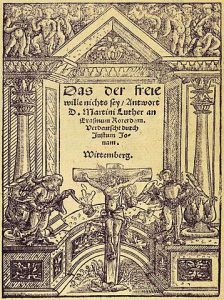
Freedom of will. A crucial point for Erasmus.
In his De libero arbitrio diatribe sive collatio (1524), he lampoons the Lutheran view on free will. He lays down both sides of the argument impartially. In response, Luther wrote his De servo arbitrio (On the Bondage of the Will) (1525), which attacks the “Diatribe” and Erasmus himself, going so far as to claim that Erasmus was not a Christian.
Erasmus responded with a lengthy, two-part Hyperaspistes (1526-27). In this controversy Erasmus lets it be seen that he would like to claim more for free will than St. Paul and St. Augustine seem to allow. For Erasmus the essential point is that humans have the freedom of choice.
As the popular response to Luther gathered momentum, the social disorders, which Erasmus dreaded and Luther disassociated himself from, began to appear, including the Peasants’ War, the Anabaptist disturbances in Germany and in the Low Countries, iconoclasm and the radicalization of peasants across Europe. Would Erasmus be responsible for having started the war between the Roman Catholic Church and the Protestants? How tolerant was the doctrine of Luther based on his position on Predestination against Freedom of Will?


